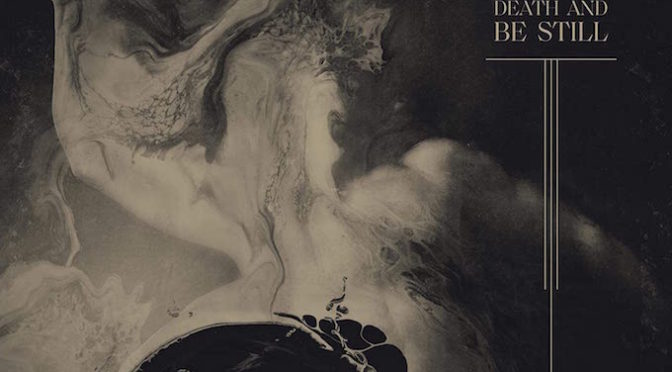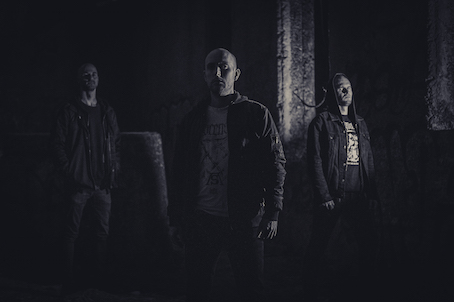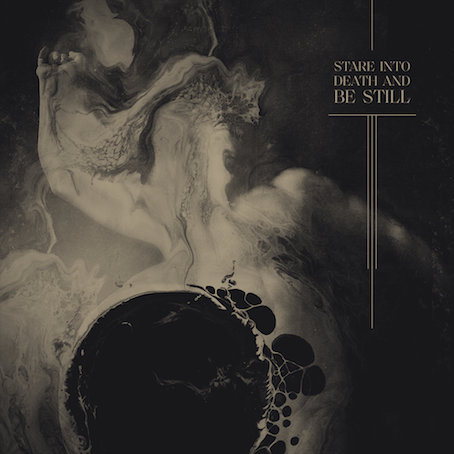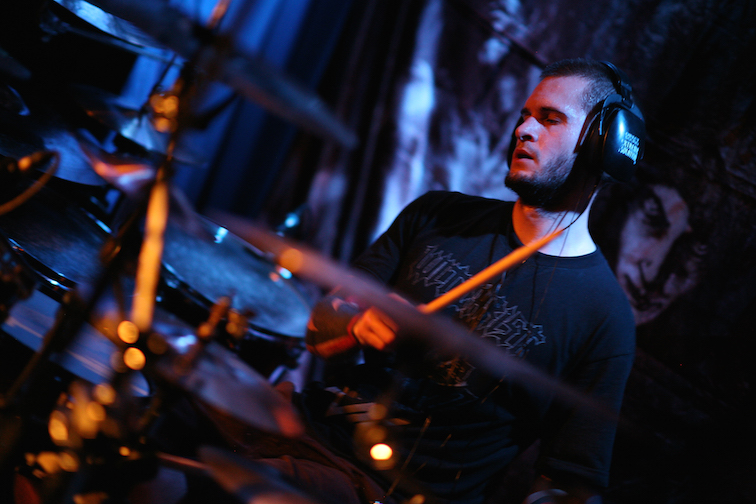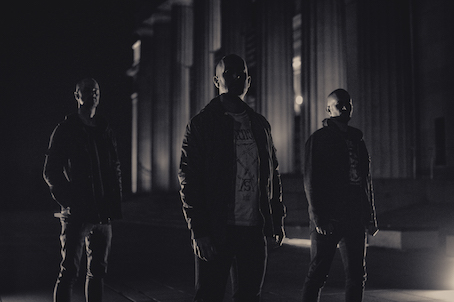EXCLUSIVE: INTERVIEW WITH JAMIE SAINT MERAT OF ULCERATE!!
“We Knew Early On That We Needed To Capitalise On a Far Greater Sense Of Melody Than We Ever Had Before, And Really Challenge Our Own Intuitions.”
DISC REVIEW “STARE INTO DEATH AND BE STILL”
「早い段階で、これまでよりもさらに強くメロディのセンスを活用して、自分たちの直感に挑戦する必要があると気付いたんだ」
テクニカルかつアトモスフェリックなデスメタルとして高い評価を得ているUlcerate。その6作目となる『Stare Into Death And Be Still』は、彼らにとっては挑戦的な作品となりました。20年以上のバンド生活で養った本能は、いつしか「混沌」や「醜さ」「汚さ」に偏っていたようです。その偏りを「雪崩のように大量の素材を書いては捨てた」ことで洗い流したあとに芽生えてきた、異質なリフやパターン。そこには「力」や「美しさ」「明瞭さ」がはっきりと宿っていました。
彼らはその異質さをしっかりと捉え、さまざまな角度から強化していきます。もっともわかりやすいのがプロダクションの方向性でしょう。「今回のライティングとプリプロダクションの哲学は、混沌よりも力を優先すること」。そう語るJamieのことば通り、本作の音は明瞭で太く、暖かみさえ感じます。また、彼のドラミングにも変化がありました。メタルからジャズ、ファンクと、さまざまなジャンルのドラマーからそのスタイルを吸収してきたエクストリームメタル界きっての名手の彼ですが、本作では人生の大半をかけて磨いてきたそのテクニックを抑制し、曲そのものを活かすパフォーマンスを志向したのです。
彼らにとっては挑戦的なこうした変化は、リスナーにとってはむしろ“親しみやすい”作風に変化したと感じられるかもしれません。ただし、その親しみやすさは『Stare into Death and Be Still』というタイトルに接続しています。「死への畏敬」。死は常に突然に、暴力的にやってくるものではなく、ときには冷静にはっきりと観察せざるを得ない。そうした「穏やかな恐怖」とでもいうべき感情が、そしてそれに立ち向かうための意志が、「混沌」から「力」へと向かった彼らの作品には宿っています。
「もし『音としてはよいが意味がわからない』歌詞だったり、テキストとしては出来がよくてもフレーズがひどい歌詞だったりしたら、何の役にも立たないからね」。その通り、本作のテキストとそのサウンドは、楽曲と高度に一致しています。
このように、彼らは各要素を綿密に調整して作品を作っています。しかし、その綿密さは、あくまで彼らの精神と肉体から生み出されたものでなければなりません。「自分が演奏しているものが最終的な品物であること意識する」。コンピューターによる演奏の修正や数値管理を否定し、ライン入力ではなく部屋録りを志向する彼らの作品が、整理されたテクニカルさではなく、うねるようなグルーヴと、真に迫るアトモスフィアをまとっているのはうなずけます。
曲、歌詞、演奏、レコーディング、プロダクション……彼らの哲学のもとに、それらすべてが生々しく一体化したデスメタルの名盤がここに誕生しました。今回弊誌では、ドラマーのJamie Saint Meratにインタビューを行うことができました。「完璧は芸術の敵だ」。どうぞ!
WORDS & INTERVIEW BY 江戸大 (DECAYED SUN RECORDS )
ULCERATE “STARE INTO DEATH AND BE STILL” 10/10
INTERVIEW WITH JAMIE SAINT MERAT
Q1: I found this album to be smoother in its flow than before, while still maintaining a meticulous and complex structure. “Shrines of Paralysis” was more straightforwardly melodic than before, but this album is more “melodic” in composition itself… you mentioned in an interview on “Shrines of Paralysis” that this kind of musical development happens “naturally”. Can you tell us some of the events and creations that you and the other members were particularly interested in during the production so that we can capture a bit of that “natural”‘s background? And why have they attracted your attention?
【JAMIE】: We’ve been writing music together for the better part of 20 years now, so when I say ‘natural’ I’m meaning it’s instinctual. But when it came to this sixth album, we actually approached it from a completely different angle. We knew early on that we needed to capitalise on a far greater sense of melody than we ever had before, and really challenge our own intuitions. So for the first 6-8 months of 2018 we went into experimentation mode, to really push ourselves out of our comfort zones. An avalanche of material was written and ultimately thrown out, as we strived to find the right balance of filth and clarity – knowing when to pull back and when to go for the throat. But eventually riffs and patterns started to emerge that felt very unique, and a little alien for us – and it was these first moments of clarity that set the tone and pace for the writing and pre-production throughout 2019.
Q1: 本作は、綿密で複雑な構成を維持しながら、従来よりもその流れがスムーズだと私は感じました。前作『Shrines of Paralysis』は従来よりもストレートにメロディが表現された作品でしたが、本作は構成そのものが「メロディック」とでも言いますか……
あなたは前作のインタビューでこのような音楽的発展が「自然」に起きていると話していました。その「自然」の背景を少しでも私たちが捉えられるように、制作中にあなたや他のメンバーが特に関心をもっていた出来事や創作物をいくつか教えていただけますか?また、それらはなぜあなたがたの関心を惹いたのでしょうか?
【JAMIE】: メンバーとはもう20年以上も一緒に音楽を作っているから、「自然」は「本能的」と言い換えることもできる。ただ、今回の6枚目のアルバムに関しては、実はまったく違う角度からアプローチしている。早い段階で、これまでよりもさらに強くメロディのセンスを活用して、自分たちの直感に挑戦する必要があると気付いたんだ。だから、2018年の最初の6~8ヶ月間は実験モードに入って、自分たちのコンフォートゾーンから自分たちを押し出すことにした。
汚さと明瞭さのちょうどよいところを見つけるため、つまりいつ引いていつ喉元に食らいつくのかを知るために、雪崩のように大量の素材を書いては捨てたよ。最終的に、非常にユニークで、私たちにとっては少し異質な感じのするリフやパターンが現れ始めた。それが、ライティングとプリプロダクションのトーンとペースが決まった、2019年の最初の明快な瞬間だった。
Q2: The mix and production of this album is excellent. It has both the clarity that conveys the detailed expression of the performance and the raw unity that seems to assault the dense space. In my opinion, the sound of the past work has been in a direction where the aggression of each instrument is prominent (for example, the drums are very loud). Can you tell us what your intentions were in regards to the sound of this album?
【JAMIE】: I’d say your characterisation there is actually totally accurate. And as I mentioned earlier – it’s always about constantly finding that fine line between beauty and ugliness. Both ‘Vermis’ and ‘Shrines…’ were intentionally produced and mixed very much so on the uglier side of the spectrum – yet this time around it was a completely different approach. The philosophy with both the writing and pre-production was power over chaos, and I didn’t want any details to be obfuscated as they have been in these prior albums – that kind of an approach wouldn’t benefit this new material at all (all avenues were explored during pre-production to find the best ‘fit’).
Q2: 本作のミックスやプロダクションはすばらしいです。細かい演奏の表情が細かく伝わる明瞭さと、密度のある空間が襲い掛かってくるような生々しい一体感を両立しています。過去の作品のサウンドは、各楽器の攻撃性が際立つような方向性だったように思います(たとえば、ドラムの音量はとても大きいです)。
本作のサウンドについて、あなたがたがどのような意図を持っていたのか教えていただけますでしょうか?
【JAMIE】: 君の言ったサウンドの特徴は完全に正しい。先ほども言ったが、美と醜の間にある微妙なラインをずっと模索していた。『Vermis』や『Shrines of Paralysis』は、意図して大幅に醜さに寄せて編集・ミックスをしたが、今回は全く違うアプローチを取った。
今回のライティングとプリプロダクションの哲学は、混沌よりも力を優先すること。これまでのアルバムのように細部が不明瞭になるのは避けたかったんだ。従来のアプローチは、今回の新しいマテリアルには似つかわしくなかっただろう。最高の「フィット感」を見つけるために、プリプロダクション中あらゆる道筋を模索したよ。
Q3: What is your philosophy as a mixer/arranger/producer? It seems that today’s DAWs are capable of doing roughly everything an artist can think of. In that context, what edits did or did not you make to the album? And what were the thoughts behind that decision?
【JAMIE】: My thinking when it comes to production for this style of music is that you should leverage a DAW as little as possible. If you’re doing electronic music then that’s a completely different ballgame. But any style of music that is predicated on humans playing instruments where you need to capture attitude and spirit shouldn’t be even remotely looking towards these all-too-common techniques. So I stay far away from fixing performances, and any sort of quantisation etc. I’ve always wanted to capture performances as they are, using real drums, real amps. I like to get tones in the room and commit, so I never take DI’s for example. The spontaneity and adrenaline of knowing that what you’re playing is the final product I think greatly aids performances. Perfection is the enemy of art.
Q3: あなたのミキサー/アレンジャー/プロデューサーとしての哲学を教えてください。
現在のDAW(※1)は、アーティストが考えうるおおよそすべてのことが実現できるように思います。その中で、あなたは本作でどのような編集を行った、または行わなかったのでしょうか。そして、その判断の背景にはどのような考えがあったのでしょうか?
【JAMIE】: このスタイルの音楽を作るようになって以来、DAWはできるだけ活用するべきではないと考えている。もちろん、エレクトロニック・ミュージックを作るのであれば、まったく話は変わってくる。しかし、人間が楽器を演奏することを前提とし、哲学や精神をとらえる必要がある音楽スタイルでは、そういったありふれたテクニックに目を向けるべきではない。だから、私は演奏の修正や、あらゆる種類の定量化からは距離を置いている。いつだって、本物のドラムやアンプを使って、ありのままのパフォーマンスを捉えようとしてきた。部屋録りで得た音色を入力するのが好きなんだよ。だから、たとえばDI(※2)は絶対に使わない。自分が演奏しているものが最終的な品物であること意識する。それによって得られる自発性とアドレナリンは、パフォーマンスの大きな助けとなると考えている。完璧は芸術の敵だ。
※1 DAW:音楽制作ソフトの総称。
※2 DI(ダイレクト・ボックス):ギターやベースなどを直接DAWに接続して録音する場合に使う機器 。
Q4: Were there any changes from the last album in terms of the production process, equipment and software?
【JAMIE】: From an audio perspective, not so much. We always like to vary the instrumentation from album to album, be it cymbal choices, amp and cabinet combinations etc. But for the most part mic selections and preamps are almost identical between this album and ‘Shrines’ for example. I know what works well for us, and am more interested in changing tones at the source than trying to shape things with mic selections for example.
Q4: 制作のプロセスや機材、ソフトウェアに関して、前回のアルバムから変わった点はありましたか?
【JAMIE】: オーディオという点では、それほどやり方は変わってはいない。もともと、アルバムごとに機材を変えるのが好きだからね。たとえばシンバルの選択、アンプやキャビネットの組み合わせなどだ。
一方で、マイクやプリアンプは『Shrines of Paralysis』と今回のアルバムではほとんど同じものを使っている。このバンドで何がうまく機能するかは分かっているし、たとえばマイクの選択などでサウンドを形作るよりも、もとの音色を変えるほうに興味があるね。
Q5: Your drumming is one of Ulcerate’s big draws, as it flexes and shrinks while maintaining strength. In addition to that, simple structured beats, tight syncopation, and marching rhythms appear on this album (like “Exhale the Ash” and “There is No Horizon”). You profess to be influenced by various styles of drummers outside of metal, such as jazz and funk. What new drum playing and styles did you explore between “Shrines of Paralysis” and “Stare into Death and Be Still”? And how is that reflected in this album?
【JAMIE】: I can’t really pinpoint anything specifically – I’ve been obsessed with drums most of my life, and my ears are always open. I guess a fairly drastic shift with this album has been a very conscious decision to reign things in a little to serve the riffs in a more direct way. So not being afraid to introduce back beats for example where they’re absolutely required, which I’ve definitely stayed away from in the past. Mostly I’m just becoming more and more interested in how drums serve songs, and trying to draw myself out of a drum-centric approach. There’s a lot of moments on this album where I rearranged parts to be a lot simpler than they first were to heighten the overall impact of the entire orchestration.
Q5: 強度を保ちながら柔軟に伸び縮みするようなあなたのドラミングは、Ulcerateの大きな魅力のひとつです。本作では、従来のうねりながら躍動するプレイに加えて、シンプルな骨格のビートや、タイトなシンコペーションが目立ちます(「Exhale the Ash」や「There is No Horizon」など)。マーチングのようなリズムも登場しますね。
あなたはメタル以外にもジャズやファンクなど、さまざまなスタイルのドラマーからの影響を公言しています。『Shrines of Paralysis』から本作『Stare into Death and Be Still』までの間に、新たにどのようなドラムプレイやスタイルを探求しましたか?そして、それはどのように作品に反映されているのでしょうか?
【JAMIE】: 具体的に何と特定することはできない。人生の大半をドラムに捧げ、さまざまなプレイに耳を傾けてきたからね。
今回のアルバムでは、リフをより直接的な形で表現するために、控えめなプレイをかなり意識した。それが劇的な変化をもたらしたんだろう。たとえば、バックビートは、絶対に必要だという場面でも、以前ならまず使うのを避けていたが、今回は臆せずに使うようにした。
曲のためにどうドラムを役立てるかにますます興味を持つようになったし、ドラム中心のアプローチから抜け出すよう試みている。今回の作品では、全体の演奏のインパクトを高めるために、当初の演奏よりもかなりシンプルにアレンジしたパートがたくさんある。
Q6: If you had to say “that’s my drumming” to other people, especially non-metal lovers, to listen to Ulcerate, which part of the song would you choose and why?
【JAMIE】: The mid-section of ‘Drawn into the Next Void’ and perhaps the intro section of ‘Visceral Ends’ I think showcases some more ‘relatable’ drumming that doesn’t rely on blast beats or other metal-specific techniques, which are often extremely alien and confronting to untrained ears.
Q6: もしあなたが「これが私のドラムプレイです」と他人にUlcerateを聞かせるとしたら、本作のどの曲のどの部分を選びますか?
【JAMIE】: 「Drawn into the Next Void」の中盤や「Visceral Ends」のイントロでは、ブラストビートやメタル特有のテクニックに頼らない、より「親近感の持てる」ドラミングを披露していると思う。メタル特有のテクニックは、訓練されていない耳にとっては本当に異質で、負担になるだろうからね。
Q7: Throughout your explorations as a drummer so far, I think you’ve learned a lot of expressions that wouldn’t have suited Ulcerate. Have you ever thought about starting a project that would adequately represent your non-metal side of things?
【JAMIE】: Yeah for sure – we all have various side-projects outside of Ulcerate where we explore other means of expression.
Q7: これまでのドラマーとしての探求を通して、Ulcerateには似合わないような表現をあなたはたくさん習得したと思います。あなたのメタル以外の側面を十分に表現できるようなプロジェクトを始めようと思ったことはありますか?
【JAMIE】: もちろん、私たちは全員、さまざまな表現を探求するための、Ulcerate以外の多様なサイドプロジェクトを持っている。
Q8: Part of Ulcerate’s appeal is that its musicality and lyrics are highly aligned. How does it come into being? Is it entirely the work of Paul? Or do you ever receive a lyrical theme from Paul while working on a song and come up with new musical ideas?
【JAMIE】: The music is always composed and arranged first, after which Paul will draft up initial lyric ideas and arrangements. We’ll then take these first ideas and start pre-producing them immediately over the pre-recorded track so see how things shape up. It’s here we’ll quickly find out what’s working in terms of how the lyric fits the part, the enunciation, rhythms etc. And we’ll all feed back at this stage, even at the level of how words fit and sound in sentences. It’s of no use to anyone if you have lyrics that ‘sound’ great but make no sense, or lyrics that on paper read well but phrase terribly against the music.
Q8: Ulcerateは音楽性と歌詞が高度に一致していることも魅力のひとつですが、その一致はどのようにして生まれているのでしょうか?完全にPaulの手によるものですか? 制作中にPaulから歌詞のテーマを受け取って、新しい音楽的アイデアが思い浮かぶことはありますか?
【JAMIE】: つねに最初に作曲とアレンジを行い、その後にPaulが歌詞とアレンジを下書きしていく。それからすぐ、そのアイデアをもとに、録音したトラック上でプリプロデュースを始めて様子を見る。
ここで、歌詞とパートのフィット感や、発音、リズムなどで、うまくいっている部分が明らかになる。この段階で、単語が文章にどのようにフィットしているか、どのように聞こえるかというレベルでも、フィードバックをしていく。
もし「音としてはよいが意味がわからない」歌詞だったり、テキストとしては出来がよくてもフレーズがひどい歌詞だったりしたら、何の役にも立たないからね。
Q9: This release is on Debemur Morti Productions, can you tell us why you left Relapse and signed with Debemur Morti Productions out of the many labels out there? Was it simply because they were attractive as business partners? Or was it because their label colors, which featured many of the atmospheric and inventive black metal (or adjacent textures) artists represented by Blut Aus Nord, suited the current Ulcerate?
【JAMIE】: Debemur Morti is a perfect artistic and conceptual alignment for us at this stage in our career. Relapse has always treated us exceptionally well – extremely respectful and professional, and the team that we worked with there are great people. But when it came time to start thinking about renewing our contract with them or potentially look elsewhere, it was really a matter of considering what’s best for the art. We have a ‘big’ enough profile within our niche that to me the size of the label doesn’t matter – it’s the level of quality and aesthetic attention to detail. DMP had actually reached out to us around the time of ‘Vermis’ and they’ve always been in my peripheral view. After some great discussions with label owner Phil it became clear that this was a perfect match for us moving forward.
Q9: 本作はDebemur Morti Productions(以下DMP)からの発売となりました。名門Relapseから離れ、数あるレーベルの中でDMPと契約した理由を教えていただけますでしょうか?
単にビジネスパートナーとして魅力的だったからでしょうか? それともBlut Aus Nordを代表とするアトモスフェリックかつ独創的なブラックメタル(あるいはそれに隣接した質感の)アーティストを数多く扱うレーベルカラーが、現在のUlcerateに合っていたからでしょうか?
【JAMIE】: DMPは、私たちの今のキャリアにとって、芸術的にもコンセプト的にも完璧な調整をしてくれた。もちろん、Relapseは常に私たちを良く扱ってくれていた。敬意をもっていて、プロフェッショナルで、一緒に仕事をしたチームは人たちは皆素晴らしかった。ただ、契約更新のタイミングで、私たちの表現にとって何がベストなのかを最重要視して再考した。このニッチな分野では、私たちは十分「ビッグ」な経歴を持っているから、レーベルの規模は問題ではなかった。品質と、細部に至るまでの審美眼が重要だったんだ。
実は、DMPからは『Vermis』の頃に連絡をもらっていたし、彼らはずっと私たちのことを気にかけてくれていた。レーベルのオーナーであるPhilと話し合った結果、DMPが今後の活動に完璧にマッチしていることがはっきりしたんだ。

